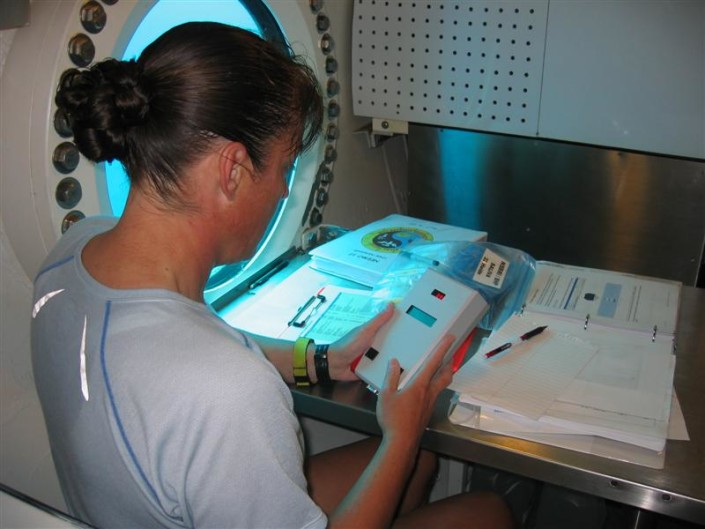Neurobehavioral and Psychosocial Factors Team

During NEEMO 12, veteran astronaut Heidemarie Stefanyshyn-Piper is shown with a Psychomotor Vigilance Test (PVT) Self Test device. Photo by NASA.
 Astronauts on long-duration space missions will endure the isolation and confinement of the space environment to a greater degree than previous space travelers and terrestrial explorers. Methods crews use to deal with stress and the challenges of long space voyages will be critical to the mission’s success.
Astronauts on long-duration space missions will endure the isolation and confinement of the space environment to a greater degree than previous space travelers and terrestrial explorers. Methods crews use to deal with stress and the challenges of long space voyages will be critical to the mission’s success.
In addition to identifying neurobehavioral and psychosocial risks to crew health, safety and productivity, Team objectives include developing methods to monitor brain functions and behavior, and countermeasures to enhance performance, motivation and quality of life. The Neurobehavioral and Psychosocial Factors Team is evaluating leadership style, crew composition and cohesion, organization, and adequate communication to optimize crew effectiveness and mission success. The Team’s efforts also include projects as part of the Mars 500 study that occurred in Moscow, Russia and other analog environments.
In addition to meeting the needs of astronauts, the Team’s research products will have benefits for workers in safety-sensitive and remote locations on Earth.
Leaders
Team Leader:
David F. Dinges, Ph.D.
Perelman School of Medicine at the University of Pennsylvania
Associate Team Leader:
Robert D. Hienz, Ph.D.
Johns Hopkins University School of Medicine
Impact in Space
The Neurobehavioral and Psychosocial Factors Team aims to ensure astronaut readiness to perform by developing pre-flight prevention programs to avoid as many risks as possible to individual and group behavioral health during flight, detecting individual and crew problems as early as possible during flight, and applying effective interventions during and after spaceflight.
The Team’s anticipated deliverables for spaceflight include:
- Improved training for group living and optimal communication between the flight crew and ground team;
- Methods to enhance communication relative to crew problem-solving;
- A computer-based system for managing interpersonal conflicts and for self-diagnosis and self-help treatment for depression;
- Specific selection criteria for optimal crew performance;
- Automated computer vision for unobtrusive optical recognition of stress;
- Recommended behavioral and pharmacological treatments for neurobehavioral problems;
- Technologies for rapid assessment of individual and team performance;
- Recommendations for habitability strategies for privacy and work effectiveness, and;
- Techniques to optimize assimilation of crews and families after return.
Impact on Earth
The research conducted by the Neurobehavioral and Psychosocial Factors Team has applications for health care and many aspects of work environments on Earth. The research has benefits for Earth use in the following ways:
- For safety-sensitive occupations, workers can benefit from computer-assisted assessment tests and handheld devices for performance readiness;
- People working in remote locations can benefit from improved training and interventions for psychosocial or emotional conflicts; and
- Techniques for improved individual and group communication, conflict resolution and monitoring for depression and neurocognitive disorders can be used in various settings – the workplace, military operations, team structures and isolated work environments.





